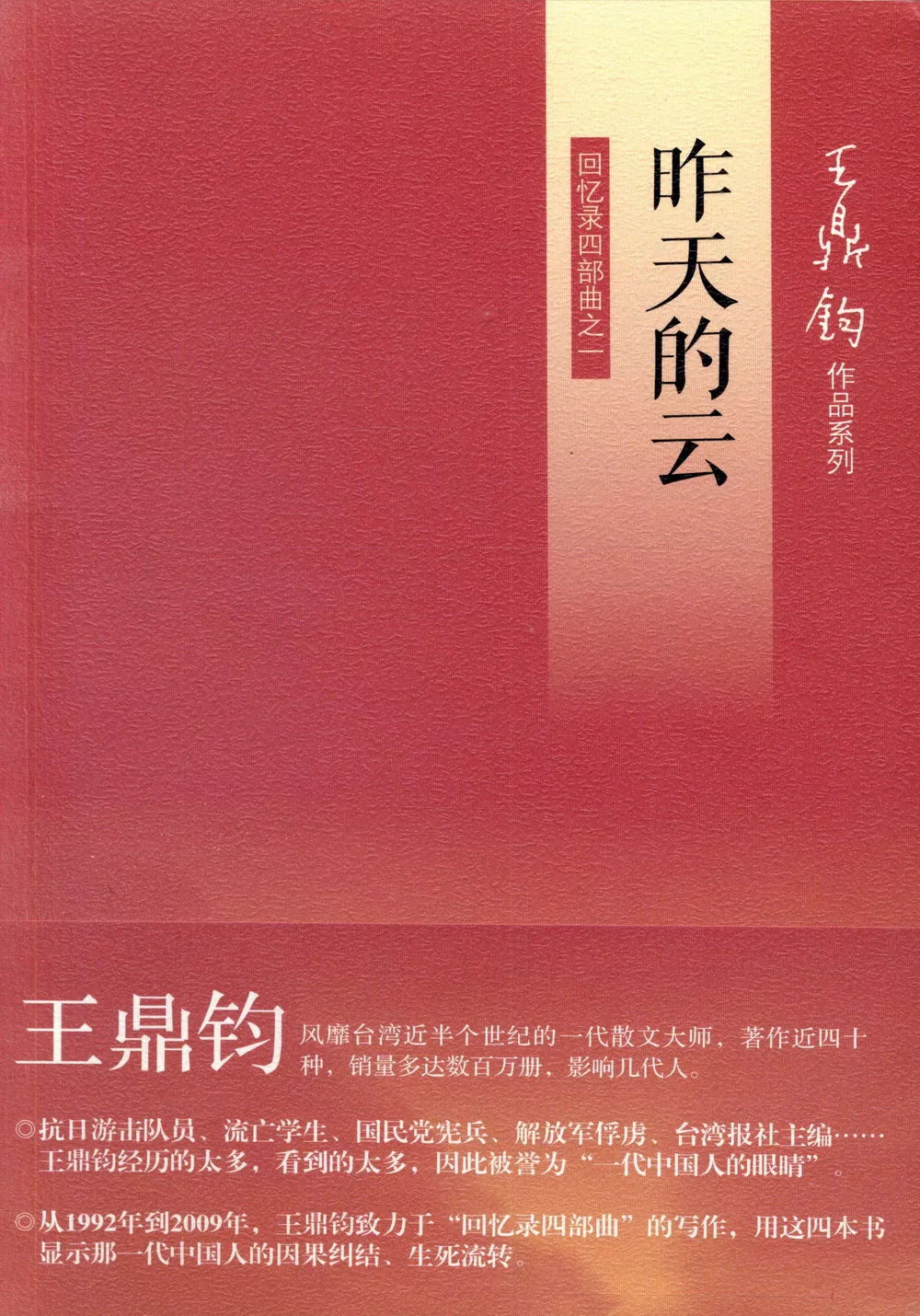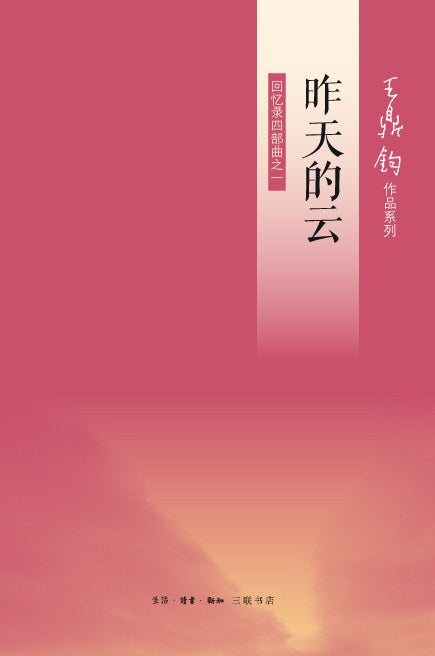1
/
of
2
Yesterday's Clouds
Yesterday's Clouds
Wang Dingjun
Regular price
$14.99 USD
Regular price
Sale price
$14.99 USD
Unit price
/
per
Out of stock
Couldn't load pickup availability
About Book
About Book
This first volume in Wang Dingjun's "Memoirs in Four Parts" chronicles his hometown, family, and the early years of the War of Resistance Against Japanese Aggression. The author effortlessly captures the local customs, historical anecdotes, and farm labor of his hometown; simultaneously, he places his individual experiences within the broader social context, capturing the larger picture through the small, revealing a depth and power within his unadorned simplicity.
He wrote about the causal entanglements and the cycle of life and death of Chinese people in the 20th century by waiting for a lifetime of freedom. Qi Bangyuan, Zhu Xining, Yang Zhao, Gao Hua, and Wang Qisheng recommend Wang Dingjun's four memoirs: "Yesterday's Clouds", "The Angry Boy", "The Road to the Mountain", and "Literary Jianghu".
"During the War of Resistance Against Japanese Aggression, I lived in Japanese-occupied areas and also in the rear areas of the war effort. During the Civil War, I served in the Nationalist Army and witnessed both the KMT at its peak and the Communist Party's complete victory. I was a prisoner and served in liberated areas. During the War of Resistance Against Japanese Aggression, I received the KMT's wartime education and was baptized by authoritarian ideology. Later, in Taiwan, swept by the tide of the times, I was reconstructed by the ideas of democracy and freedom. I have experienced great hardships and great heat, profound destruction and reconstruction... My experience is complete. I believe that God has kept me until now so that I can bear witness."
The War of Resistance Against Japanese Aggression, exile, civil war, white terror... the world was in chaos at that time, but these four memoirs have a clear thread, showing the turbulent times like the Flaming Mountain through personal experiences of separation and chaos. It reads like a chapter novel, with wonderful stories connected one to another - this is actually what the octogenarian author has earned with his youth and blood and tears!
What's remarkable is that the author doesn't write this memoir as a tearful indictment of his own blood. Instead, he uses his own experiences, thoughts, actions, and knowledge, employing the pursuit of beauty in literature, truth in history, and the search for understanding in philosophy to transform these tears into a pearl, presenting the existence of a generation and attempting to awaken modern attention to and understanding of the most important collective experiences of the Chinese people of that era. Without sensationalism or outcry, the work is calm and composed, yet it possesses an epic grandeur and soul-touching power.
"Fighting Through the Mountains and Rivers" won the United Daily News Readers' 2005 Best Book Award, "The Memoirs Quartet" was named one of the China Times' 2009 Top Ten Books, and "Literary Jianghu" won the Grand Prize at the 3rd 2010 Taipei International Book Fair.
A memoir is a cloud from yesterday; making that cloud reappear is the meaning of this book.
Why, after writing such ethereal, lyrical essays and novels as "Broken Glass" and "Left Atrial Vortex," did Wang Dingjun begin writing autobiographical narratives of a return from splendor to mediocrity? Perhaps it's not just because, at this point, "life has no secrets or miracles, fantasy has retreated, excitement has vanished." Yesterday's clouds are the reality of life, rising from a childhood nurtured by parents, to the baptism of war, the years of first encountering the earth beneath the blast of artillery fire, filled with the deepest and purest human affection.
——Qi Bangyuan
He wrote about the causal entanglements and the cycle of life and death of Chinese people in the 20th century by waiting for a lifetime of freedom. Qi Bangyuan, Zhu Xining, Yang Zhao, Gao Hua, and Wang Qisheng recommend Wang Dingjun's four memoirs: "Yesterday's Clouds", "The Angry Boy", "The Road to the Mountain", and "Literary Jianghu".
"During the War of Resistance Against Japanese Aggression, I lived in Japanese-occupied areas and also in the rear areas of the war effort. During the Civil War, I served in the Nationalist Army and witnessed both the KMT at its peak and the Communist Party's complete victory. I was a prisoner and served in liberated areas. During the War of Resistance Against Japanese Aggression, I received the KMT's wartime education and was baptized by authoritarian ideology. Later, in Taiwan, swept by the tide of the times, I was reconstructed by the ideas of democracy and freedom. I have experienced great hardships and great heat, profound destruction and reconstruction... My experience is complete. I believe that God has kept me until now so that I can bear witness."
The War of Resistance Against Japanese Aggression, exile, civil war, white terror... the world was in chaos at that time, but these four memoirs have a clear thread, showing the turbulent times like the Flaming Mountain through personal experiences of separation and chaos. It reads like a chapter novel, with wonderful stories connected one to another - this is actually what the octogenarian author has earned with his youth and blood and tears!
What's remarkable is that the author doesn't write this memoir as a tearful indictment of his own blood. Instead, he uses his own experiences, thoughts, actions, and knowledge, employing the pursuit of beauty in literature, truth in history, and the search for understanding in philosophy to transform these tears into a pearl, presenting the existence of a generation and attempting to awaken modern attention to and understanding of the most important collective experiences of the Chinese people of that era. Without sensationalism or outcry, the work is calm and composed, yet it possesses an epic grandeur and soul-touching power.
"Fighting Through the Mountains and Rivers" won the United Daily News Readers' 2005 Best Book Award, "The Memoirs Quartet" was named one of the China Times' 2009 Top Ten Books, and "Literary Jianghu" won the Grand Prize at the 3rd 2010 Taipei International Book Fair.
A memoir is a cloud from yesterday; making that cloud reappear is the meaning of this book.
Why, after writing such ethereal, lyrical essays and novels as "Broken Glass" and "Left Atrial Vortex," did Wang Dingjun begin writing autobiographical narratives of a return from splendor to mediocrity? Perhaps it's not just because, at this point, "life has no secrets or miracles, fantasy has retreated, excitement has vanished." Yesterday's clouds are the reality of life, rising from a childhood nurtured by parents, to the baptism of war, the years of first encountering the earth beneath the blast of artillery fire, filled with the deepest and purest human affection.
——Qi Bangyuan
Publication Date
Publication Date
2013-01-01
Publisher
Publisher
生活·读书·新知三联书店
Imprint
Imprint
Pages
Pages
224
ISBN
ISBN
9787108042200
share



